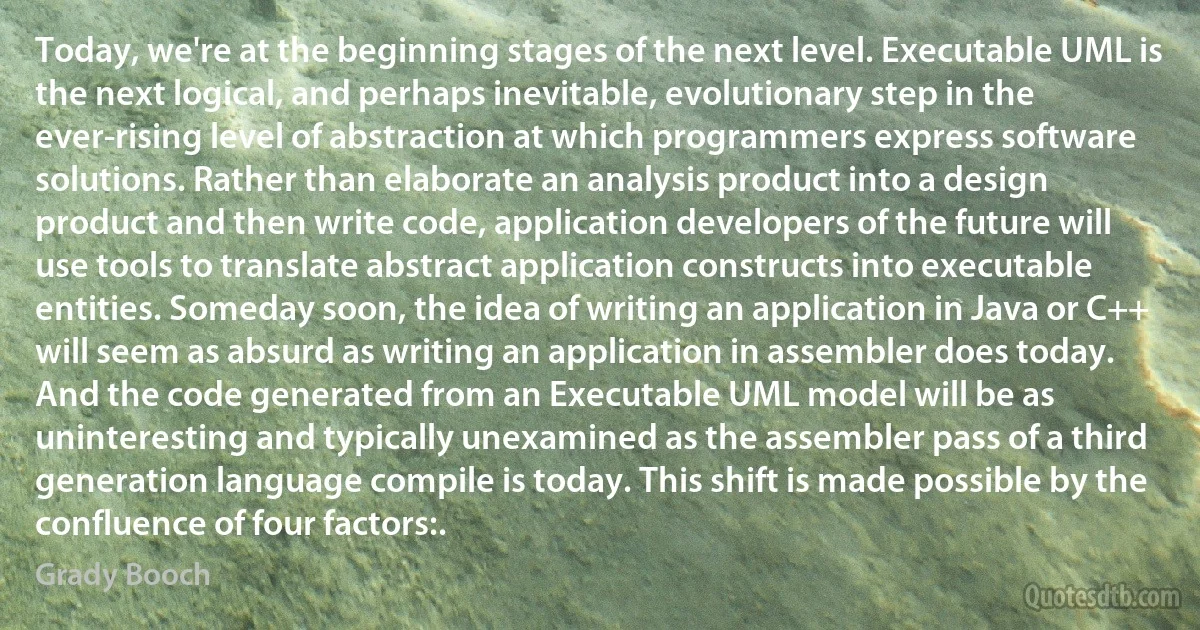
Today, we're at the beginning stages of the next level. Executable UML is the next logical, and perhaps inevitable, evolutionary step in the ever-rising level of abstraction at which programmers express software solutions. Rather than elaborate an analysis product into a design product and then write code, application developers of the future will use tools to translate abstract application constructs into executable entities. Someday soon, the idea of writing an application in Java or C++ will seem as absurd as writing an application in assembler does today. And the code generated from an Executable UML model will be as uninteresting and typically unexamined as the assembler pass of a third generation language compile is today. This shift is made possible by the confluence of four factors:.
Grady BoochRelated topics
abstract abstraction beginning code compile confluence four future generation idea java language model next pass perhaps possible step third translate use write today softwareRelated quotes
I like Sarah Palin, and I've heartily enjoyed her arrival on the national stage. As a career classroom teacher, I can see how smart she is - and quite frankly, I think the people who don't see it are the stupid ones, wrapped in the fuzzy mummy-gauze of their own worn-out partisan dogma. So she doesn't speak the King's English - big whoop! There is a powerful clarity of consciousness in her eyes. She uses language with the jumps, breaks and rippling momentum of a be-bop saxophonist. I stand on what I said (as a staunch pro-choice advocate) in my last two columns - that Palin as a pro-life wife, mother and ambitious professional represents the next big shift in feminism. Pro-life women will save feminism by expanding it, particularly into the more traditional Third World.

Camille Paglia
The programmers who write improvements to GCC (or Emacs, or Bash, or Linŭ, or any GPL-covered program) are often employed by companies or universities. When the programmer wants to return his improvements to the community, and see his code in the next release, the boss may say, "Hold on there - your code belongs to us! We don't want to share it; we have decided to turn your improved version into a proprietary software product."
Here the GNU GPL comes to the rescue. The programmer shows the boss that this proprietary software product would be copyright infringement, and the boss realizes that he has only two choices: release the new code as free software, or not at all. Almost always he lets the programmer do as he intended all along, and the code goes into the next release.

Richard Stallman
An energetic crudity, even a riotous absurdity, has more promise in it than a clever and elegant mediocrity, because it shows that the young man is speaking out of his own heart, and struggling to express himself in his own way rather than in the way he finds in other men's books. The early works of original writers are usually very bad; then succeeds a short interval of imitation in which the influence of some favourite author is distinctly traceable; but this does not last long, the native independence of the mind reasserts itself, and although perhaps academic and critical demands are somewhat disregarded, so that the original writer on account of his very originality receives but slight recognition from the authorities, nevertheless if there is any real power in the voice it soon makes itself felt in the world.

George Henry Lewes
Now let us regard the idea of God from the magic standpoint, according to the four elements,the so-called tetragrammaton, the unspeakable, the supreme: the fiery principle involves the almightiness and the omnipotence, the airy principle owns the wisdom, purity and clarity, from which aspect proceeds the universal lawfulness. Love and eternal life are attributed to the watery principle, and omnipresence, immortality and consequently eternity belong to the earth principle. These four aspects together represent the supreme Godhead. Let us tread upon this path to this supreme Godhead practically and step by step, beginning from the lowest sphere, to arrive at the true realization of God in ourselves. Let us praise the happy man who will reach this still in his earthly existence. Us banish fear of the pains, for all of us will reach this goal.

Franz Bardon
We want to stop all immigration from Islamic countries. We want to stimulate voluntary re-emigration to Islamic countries. We want to expel all criminals with dual citizenship and deprive them of their Dutch nationality. We want to de-islamize our nation. Dear Friends, there is a lot of work to do. We, the defenders of freedom and security, have an historic duty. Our generation has been entrusted with a huge task: To oppose Islam and keep the flame of liberty burning. I say it without exaggeration: the future of human civilization depends on us. Now is a time when everyone in the West must do his duty. We are writing history here. So, let us do our duty. Let us stand with a happy heart and a strong spirit. Let us go forth with courage and save freedom!

Geert Wilders
